The Best Sleep Aids for Pregnancy
Pregnancy comes with its fair share of amazing benefits and challenges. The moment you find out you’re expecting, your entire life changes. From your diet and exercise routine to your pant size, emotions, and yes, your sleep quality. Nearly 80% of pregnant women report suffering from insomnia. Your growing belly, changing body, and hormones all play a role in why many expecting mothers find it difficult to get a good night’s sleep.
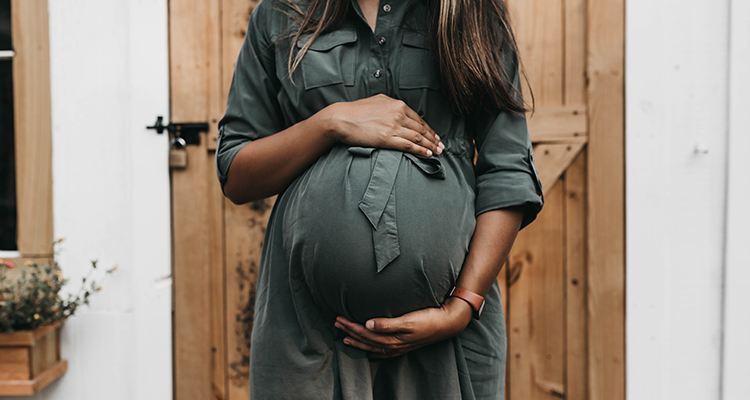
While there are plenty of at-home tips and lifestyle changes you can try that are designed to improve your sleep throughout your pregnancy (more on these below), many sleep-deprived women wonder if it’s safe to take a sleep aid while pregnant. And if so, which sleep aids for pregnancy are the best, most effective, and safest?
We’re here to answer all of your questions and more so that you can make the healthiest decision for you and your little one.
Content
The Connection Between Pregnancy and Insomnia
Before we discuss the best sleep aids for expecting mothers, let’s briefly discuss why so many pregnant women find it difficult to fall and stay asleep. It’s no secret that during those 40 weeks, your body is changing in countless ways. Not only is your belly growing, but your hormones are fluctuating, your hands, feet, and breasts are swelling, and you may feel your anxiety at an all-time high. You’re about to become a new mom and that comes with endless responsibilities and worries. All of these physical, mental, and emotional changes can significantly impact your ability to fall and stay asleep, causing insomnia.
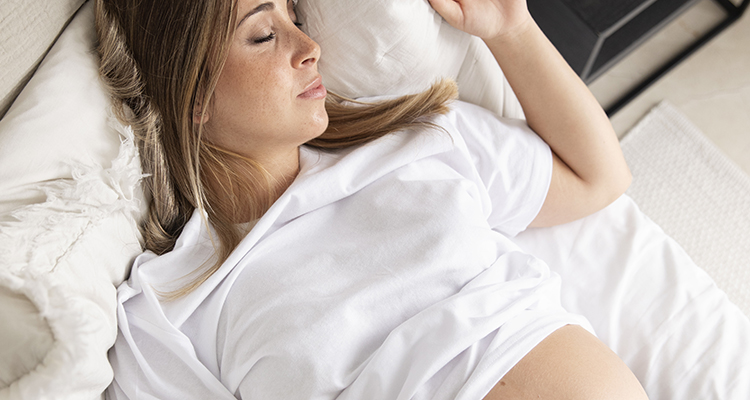
Other causes of insomnia during pregnancy include overall discomfort, the inability to find a comfortable sleep position, the frequent need to urinate, heartburn, nausea, increased stress, and more vivid or disturbing dreams.
The Best Sleep Aids for Pregnancy
If you’re struggling with insomnia during pregnancy, you’re probably willing to do just about anything to find some relief. This is especially true since now more than ever your body needs plenty of rest. After all, you’re growing a new life inside you! Lack of sleep and chronic sleep deprivation can worsen mood swings, increase depression symptoms, and lead to extreme daytime fatigue, making it difficult to perform daily tasks as you prepare for the arrival of your bundle of joy.

The good news is, there are sleep aids for pregnancy that are designed to work with an expecting mother’s sensitive body and unique needs. Here are some pregnancy sleep supplements that top the list.
Unisom
Unisom Sleep Tabs (also referred to as doxylamine) are a type of antihistamine that medical professionals agree is safe to use while pregnant. One thing to keep in mind, though, is that Unisom may cause some unpleasant side effects like malaise (general discomfort) and dry mouth. In some women, Unisom may become habit forming. You may also notice that you develop a tolerance to the medication after taking it for too long.
The Unisom brand does make herbal sleep aids as well that contain some of the same active ingredients as their sleep tabs including melatonin and diphenhydramine, both of which are deemed safe for pregnant women.
Benadryl
One of the most well-known and widely-used antihistamines is Benadryl. Not only does this antihistamine work to ease allergy symptoms but it’s also a very effective sleep aid and may be safe to use during pregnancy. This is due to how antihistamines work inside the body. Your central nervous symptom produces a chemical known as histamine which activates neurons in the cortex of your brain, causing arousal while simultaneously inhibiting neurotransmitters that promote sleep.
As the name suggests, antihistamines like Benadryl have the opposite effect. They work by blocking histamine, therefore reducing arousal and inducing drowsiness. While some people don’t like the fatigue caused by Benadryl and similar allergy medications, those suffering from sleeplessness embrace the drowsiness these mild medications provide. One such demographic includes pregnant women suffering from insomnia. The CDC reports that there are no links between antihistamines like Benadryl and birth defects, so as long as you don’t have any other underlying health issues and your doctor says it’s safe, you can safely take Benadryl while pregnant.
Melatonin
When it comes to natural sleep aids, nothing is more popular than melatonin. The natural sleep hormone is also a safe and effective option for use in pregnancy. Melatonin is the sleep hormone that your body naturally produces at night to facilitate the transition from wakefulness to sleep. It not only promotes feelings of calm and relaxation but can reduce arousal and alertness. Melatonin is a common ingredient in many OTC sleep aids.
It’s important to note that there’s been limited research done on the use of melatonin during pregnancy, however, studies have shown that it’s most likely safe for expecting mothers. It’s important to check with your doctor first before taking melatonin while pregnant.
Selective Serotonin Reuptake Inhibitors (SSRIs)
SSRIs are used to treat stress, anxiety, and depression – the three leading causes of insomnia in adults. Expecting mothers report experiencing these feelings more intensely and more frequently during pregnancy. One reason is due to fluctuating hormones including progesterone and estrogen, which can drastically affect a person’s mood.
According to one study, between 10 and 15 out of every 100 pregnant women struggle with depression or anxiety. Unfortunately, not all antidepressants are considered safe during pregnancy. The good news is, SSRIs are. Although these forms of medication aren’t sleep aids, per se, they can help ease symptoms of anxiety, stress, and depression that many pregnant women experience. Racing thoughts, worry over the arrival of the baby, and a sense of feeling overwhelmed can make it nearly impossible for expecting mothers to get the sleep they need. Antidepressants and SSRIs can help pregnant women feel more emotionally balanced, making it easier to fall and stay asleep.
As of this writing, SSRIs are not associated with birth defects in pregnant women, but research is still being done. Your doctor may recommend waiting until after the first trimester to take an antidepressant. It’s also important to read all of the potential side effects since some SSRIs like sertraline, can actually inhibit sleep.
Treating Specific Pregnancy-Related Sleep Issues
Similar to how depression or anxiety can trigger sleeplessness during pregnancy, other issues that arise over those 40 weeks could be the cause of your insomnia. By treating these underlying conditions, you may find the much-needed relief you need.
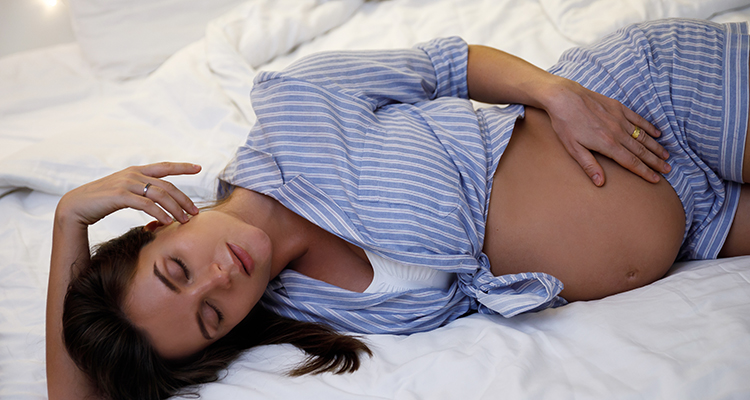
Restless Leg Syndrome
Although it’s not limited to pregnancy alone, RSL can affect as many as 34% of expecting moms. RLS is described as an uncomfortable or unpleasant tingling feeling in the legs and feet that is often worse at night. People with RLS describe an overwhelming urge to move their legs and feet to stop the discomfort. RLS is worse at night because your body is at rest, giving your muscles more time to contract. You’re also more focused on the sensations as you lie in bed with no external distractions.
RLS during pregnancy is often linked with anemia and low iron levels. By taking an iron supplement or folic acid, pregnant women may find relief for the RLS symptoms keeping them up at night. As with any other medication or supplement, check with your doctor before self-diagnosing or self-medicating your condition.
Morning Sickness and Nausea
Approximately 70% of women experience morning sickness or nausea as a result of their pregnancy. Contrary to popular belief and what the name suggests, extreme nausea and vomiting can occur day or night. For women suffering from all day nausea or morning sickness that hits during the early hours of the morning, it can significantly impact their ability to achieve a good night’s sleep.
If nausea is keeping you up at night or disturbing your sleep, there are certain medications that are safe for pregnant women and might quell your queasy stomach. Anti-nausea medication like Zofran and Diclegis are commonly prescribed for women suffering from severe morning sickness. Women with milder cases can benefit from a vitamin B6 supplement in combination with Unisom. These two medications paired together will help ease your nausea while also promoting sleep.
OTC Heartburn Medication
Heartburn and indigestion are two more common gastrointestinal issues that affect pregnant women and disrupt sleep. Over-the-counter antacids like Tums that contain calcium carbonate are relatively safe for most expecting mothers. These medications work to reduce stomach acid and indigestion that can make it difficult to fall and stay asleep. Some antacids contain potentially harmful ingredients for pregnant women including sodium bicarbonate and magnesium trisilicate, so read the labels carefully and check with your doctor before taking an antacid.
Sleep Aids to Avoid During Pregnancy
Staying safe and only ingesting approved medications during pregnancy is essential for expecting moms. Knowing the best sleep aids for pregnancy is only half the battle. You also need to know which medications and supplements to avoid. Here are some of the most common sleep aids that could be dangerous if you’re pregnant.

Ambien
Ambien is an extremely popular sleep aid, however, there’s limited research on how it may affect pregnant women and their unborn children. The Federal Drug Administration (FDA) warns that pregnant women taking Ambien during the third trimester are especially at high risk. This sleep medication can cause increased sedation and respiratory depression in babies.
Tranquilizers and Barbiturates
While tranquilizers and barbiturates can help some people suffering from insomnia, pregnant women should avoid these types of sleep aids. Research shows that these medications may have long term health effects on babies, which means the risk simply isn’t worth it. Both tranquilizers and barbiturates act as sedatives designed to trigger calm and relaxation. For many pregnant women, these medications are too strong and can cause adverse or even dangerous side effects.
Benzodiazepines
Benzodiazepines are most often prescribed to treat both anxiety disorders and insomnia in adults. These include Xanax (alprazolam) and Valium (diazepam), which are considered unsafe for pregnant women. Studies show that these drugs can have harmful effects on an unborn baby and are powerful enough to cross the placenta. Women that take benzodiazepines during pregnancy are at an increased rate of having a preterm birth or a baby with low birth weight. In rare cases where both parents used benzodiazepines during conception, babies experience “floppy baby syndrome”, or hypotonia, which causes low muscle tone. Some infants even showed withdrawal symptoms at birth.
Marijuana and Alcohol
Many insomnia sufferers turn to alcohol or marijuana for their sedative effects which can promote sleep. These are not only unhealthy options, but the initial drowsiness usually wears off after a few hours, disrupting sleep even further. When it comes to pregnancy, consuming alcohol, marijuana or any other illegal substance is extremely dangerous for both mommy and baby.
Alcohol use during pregnancy can cause developmental disabilities and birth defects which are collectively referred to as FASDs or fetal alcohol spectrum disorders. It can also cause complications with the pregnancy itself including premature birth, stillbirth, and miscarriage. Some expecting mothers think marijuana is a better alternative to alcohol for reducing stress and promoting sleep, but this drug comes with its own set of dangers for unborn babies.
According to the ACOG (American College of Obstetricians and Gynecologists, recreational marijuana use or even containing products advertised as CBD can cause serious risks for both you and your baby. This extends even further to new moms that are breastfeeding. The chemicals and ingredients in marjuana can easily be transferred from your body to your breast milk and ingested by your little one and should be avoided.
Tips for Easing Insomnia During Pregnancy
The best way to treat insomnia during pregnancy is the natural way. Experimenting with at-home remedies and adopting healthy sleep habits are the safest and most effective ways to ease insomnia symptoms plaguing you during every stage of your pregnancy.
Here are some tips for getting started.
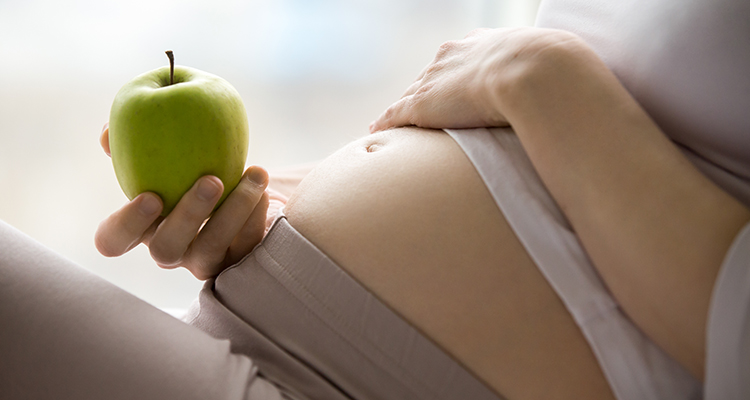
Reduce Stress and Anxiety
Everyone experiences stress and anxiety to some degree, with most adults admitting they feel at least mild stress every day! Add pregnancy into the mix and you’re likely to feel more emotionally overwhelmed than ever. Not only is your life about to change, which brings about a mix of nerves and excitement, but during pregnancy, your hormones are constantly fluctuating. You may feel confident, energetic and prepared one day only to find yourself feeling scared, exhausted, and depressed the next. All of these feelings can make it increasingly difficult to achieve quality sleep.
Whenever possible, reduce your stress and anxiety the natural way. Meditation and mindfulness are especially effective at lowering stress levels and helping pregnant women feel more relaxed. Breathing exercises can also benefit you as you prepare for labor. Prenatal massages are another great way to pamper yourself while also reducing stress and anxiety. And, as always, don’t be afraid to ask family and friends for help as you get ready to welcome your new addition.
Get Plenty of Physical Activity and Sunshine
While it may feel impossible to get up and get active during pregnancy, maintaining a normal exercise routine is extremely important for your health and well-being, as well as the health of your baby. Try incorporating a short, slow-paced walk into your daily routine. Not only is walking a great form of exercise, but it also gets you outdoors and into the sunshine. Fresh air and vitamin D can do wonders for your mood and your sleep quality. Studies show that increased daytime exposure to light can promote deeper sleep at night.
The same is said for daily physical activity. If possible, exercise in the morning for a much-needed energy and mood boost. By the end of the day, you’ll be more than ready to climb into bed and fall fast asleep. Plus, exercising during pregnancy helps both you and your little one maintain a healthy weight. Expecting mothers who exercise also see a reduction in bloating, swelling, constipation, and backaches.
Create a Healthy Diet
Most pregnant women can attest to the fact that food cravings are a real struggle during pregnancy. From ice cream to pickles and everything in between, it can be difficult for pregnant women to eat healthy when you’re constantly hungry and craving unhealthy foods. Adopting a healthy diet doesn’t have to be complicated though and may actually ease both insomnia symptoms and upset stomach in those expecting moms suffering from nausea and morning sickness.
Avoid foods that are spicy, high in fast, or deep fried. All of these foods will worsen heartburn and indigestion symptoms, especially at night when you lay down and the pressure on your stomach and chest increases. Up your protein intake and opt for whole grain foods that keep you fuller, longer, and also pack a nutritional punch since they’re packed with essential vitamins and nutrients. You should also try to consume smaller meals more frequently throughout the day. This will prevent you from feeling overfull. It also gives your body time to digest and recognize any potential food sensitivities that may be triggering your nausea.
While it’s important to stay hydrated during pregnancy, try to limit your fluid intake within two hours of bedtime. This can help prevent frequent urination during the night, which leads to sleep disruptions.
Adding herbal teas to your diet and sleep routine can also reduce queasiness and promote sleep. Chamomile and lavender tea are especially soothing and act as mild sedatives to help elicit feelings of calm and relaxation before bed. Ginger tea can also ease stress and calm an upset stomach.
Set a Sleep Schedule
Once your new addition arrives the first thing you can say goodbye to is consistent sleep. During the first few months of your little one’s life, you may only get a few hours of sleep per night and of those, most will be broken and interrupted by nighttime feedings and diaper changes. (Don’t worry, there will be plenty of cuddles and coos to make it all worth it!) Once your baby is born and falls into a better sleep routine, you can try these sleep training techniques.
During pregnancy, and while you still can, set a consistent sleep schedule that includes going to bed at the same time each night and waking up at the same time every morning. Doing so will help align your internal sleep-wake cycle, helping you naturally feel tired at night and feel more alert in the morning.
If you find yourself lying awake in bed for longer than 20 minutes, try getting up and performing a relaxing activity before going back to bed. Leaving your bedroom when you’re wide awake helps your brain and body associate your bed with sleep instead of lying awake staring at the ceiling. Relaxing activities should include walking around your house, reading a book, or meditating. Avoid putting on bright lights, using your cell phone, or turning on the TV. All of these activities can trick your brain into thinking it’s morning and you should be awake, making it nearly impossible to fall asleep.
Embrace Pregnancy and Quality Sleep
For some women, the thought of sleep and pregnancy going hand in hand seems too good to be true. Discomfort, nausea, and stress are just a few things that keep expecting mothers up at night. Lack of sleep may have you reaching for the medicine cabinet but before you do, make sure the sleep aid you’re taking is deemed safe for use during pregnancy.
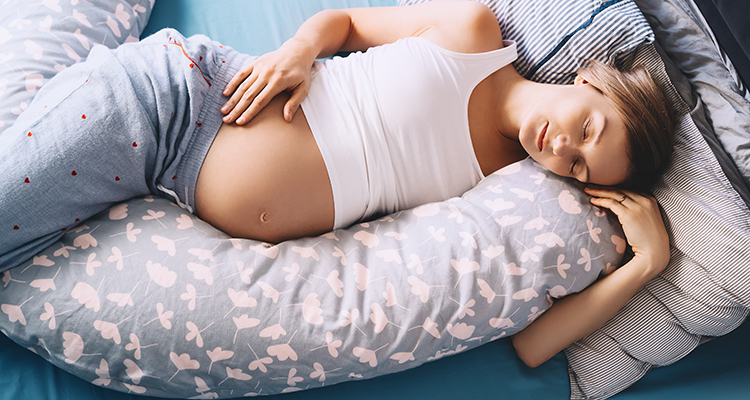
In addition to these approved sleep aids and medications for pregnant women, you can also try natural methods for improving sleep. Reducing stress, maintaining a healthy diet, and getting plenty of physical activity can all help you feel healthier, stronger, and better able to fall and stay asleep. You may also benefit from trying cognitive behavioral therapy for insomnia. These treatment methods are designed to address your specific issues and sleep needs. Click here to learn more about how it works.














